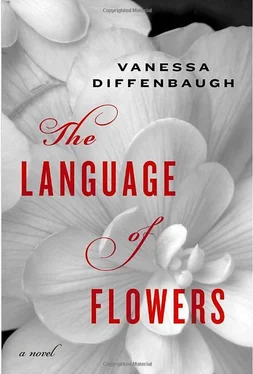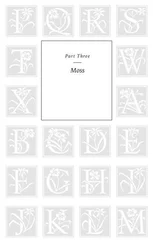I hurried into the living room. Through the window I saw Meredith’s car already in the driveway, the engine off. She studied her reflection in the rearview mirror, her hands clutching the steering wheel. Spinning around, I snuck out the back door and onto the first bus that passed.
I never saw Meredith again.
From the breweryat the bottom of the hill, steam rose smokelike into the sky day and night. I watched the spread of white while I weeded, the image infusing my contentment with an edge of despair.
November in San Francisco was mild, McKinley Square quiet. My garden, except for a sensitive matilija poppy, survived the transplant, and for the first twenty-four hours I imagined I could be satisfied with an anonymous life, hidden in the safety of the trees. I listened as I worked, prepared to run at the sound of footsteps, but no one wandered off the manicured lawn, no one poked a curious face into the forest where I crouched. Even the playground was empty except for a fifteen-minute window before school, when closely monitored children swung (one, two, three times) before continuing down the hill. By the third day, I could match the children’s voices with their names. I knew who listened to their mother (Genna), who was loved by their teacher (Chloe), and who would rather be buried alive in the sandbox than sit through another day of class (Greta, little Greta; if my asters had been in bloom, I would have left her a bucketful in the sandbox, so desolate was the voice that begged her mother to let her stay). The families couldn’t see me, and I couldn’t see them, but as the days passed I began to look forward to their visits. I spent the early mornings thinking about which child I would have been most like, had I had a mother to walk me to school every morning. I imagined myself obedient instead of defiant, quick to smile instead of sullen. I wondered if I would still love flowers, if I would still crave solitude. Questions, unanswerable, swirled like water at the roots of my wild geraniums, which I soaked deeply and often.
When my hunger grew to the point of distraction, I climbed onto buses and rode to the Marina, Fillmore Street, or Pacific Heights. I toured high-end delis, lingering at polished marble countertops and sampling an olive, a slice of Canadian bacon, or a sliver of Havarti. I asked the questions Elizabeth would have asked: which olive oils were unfiltered; exactly how “fresh” was the albacore, the salmon, the sole; how sweet were the season’s first blood oranges? I accepted additional samples, feigned indecision. Then, when the attendant turned to another customer, I walked out the door.
Afterward, my hunger barely appeased, I wandered the hills, looking for plants to add to my growing garden. I searched private yards as often as public parks, slipping beneath canopies of morning glory and passionflower. On the rare occasion I settled near a plant I could not identify, I pinched a stem and carried it quickly to a crowded restaurant, where I waited for a customer to leave before taking my place at her table. Sitting before abandoned plates of half-eaten lasagna or risotto, I placed the distressed bud in a sweating water glass, its weakened green neck drooping against the lip of the glass. As I ate small, saucy bites, I thumbed through my field guide, studying the parts of the plant and answering questions methodically: Petals numerous or not apparent? Leaves swordlike, emerging from one another, or heart-shaped? Plant with copious milky juice, ovary hanging to one side of flower, or without milky juice, ovary erect? When I had deduced the plant family and memorized its common and scientific name, I pressed the flower between the pages and looked around, hoping to find another half-empty plate.
The third night, sleep evaded me. My empty stomach churned, and for the first time, my flowers offered no reassurance. Instead, the dark floral silhouettes were reminders of the time I’d had to look for a job, the time I’d been given to start a new life. I pulled my blanket tighter around my head and closed my eyes, drifting in and out of consciousness, refusing to think about what I would do when the next day arrived, or the day after that.
In the middle of the night, I was startled awake by the sharp smell of tequila. My eyes snapped open. The heath bush I’d transplanted from an alley off Divisadero stretched its needled arms over my head. Between the new growth and glowing bell-shaped blossoms, I saw the outline of a man bend over and snap a stem of my helenium. His tequila bottle leaned over as he did, alcohol splashing out of the top and landing on the shrub concealing my body. A girl behind him reached for the bottle. She sat down on the ground with her back to me and tilted her face to the sky.
The man held out the flower, and in the moonlight I could tell he was young: too young to be drinking, too young even to be out after dark. He ran the petals along the top of the girl’s head and down the side of her face. “A daisy for my darling,” he said with an attempted southern drawl. He was drunk.
“That’s a sunflower, dumb ass,” the girl said, laughing. Her ponytail, tied with a ribbon that matched her shirt and pleated skirt, swung back and forth. She plucked the flower from between his fingers and smelled it. The small orange blossom was missing half its petals; she scattered the remaining few until the center bobbed, abandoned in the night air, and then flicked it into the forest.
The boy sat down close to her. He smelled of sweat masked by drugstore cologne. She threw the empty bottle into the bushes and turned to him.
Without pause, the boy began to devour the girl’s face with sloppy smacking sounds, his hands underneath her shirt. His tongue pushed open her mouth, and I thought she would gag, but instead she feigned a moan and grasped at his greasy hair. My own stomach lurched, a slice of salami high in my throat. I held one hand over my mouth and the other over my eyes, but still I heard them. Their kissing sounds were wet and aggressive, traveling to where I lay with such precision that they felt like ravenous fingertips, gouging my lips, my neck, my breasts.
I curled up into a tight ball, the bed of leaves crackling beneath my body. The couple kept kissing.* * *
From the bus stop the next morning, I watched a tall woman with a bucketful of white tulips slip a key into the lock of the neighborhood flower shop. She flipped on the light and the word BLOOM, created with bundled sticks, emerged backlit from the large picture window. Crossing the street, I approached her.
“Out of season,” I said, nodding to the tulips.
The woman raised her eyebrows. “Brides.” She set the bucket down and looked at me as if waiting for me to speak.
I thought of the lovers tangled under my heath. They had collapsed even closer to me than I’d thought, and I’d stepped on the boy’s shoulder blade before I could locate them in the shrubs. Neither one had moved. The girl’s lips rested on the boy’s neck as if she’d passed out in the middle of a kiss; the boy’s chin pointed up, his head pressed back into tangles of helenium as if he’d been enjoying it. In an instant, my illusion of safety and solitude had vanished.
“Can I help you?” the woman asked. She ran impatient fingers through spiky gray hair.
It occurred to me that I had forgotten to apply my hair gel, and I hoped I didn’t have leaves stuck in my hair. I shook my head self-consciously before I spoke. “Are you hiring?”
She looked me up and down. “Do you have experience?”
Running my toe along a deep line in the concrete, I considered my experience. Jam jars full of thistle and duct-taped spikes of aloe didn’t count for much in the world of flower arranging. I could spew scientific names and recite histories of plant families, but I doubted either of these would impress her. I shook my head. “No.”
Читать дальше












